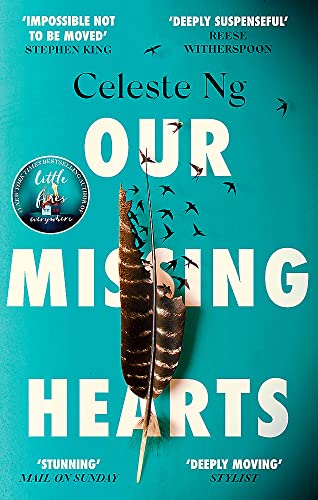After reading two pretty good domestic dramas by Celeste Ng, I wasn’t really prepared for a dystopian novel. Although I occasionally read dystopian fiction, it’s not really my thing. And this one gave me more trouble than most.
Bird is an 11-year-old biracial boy whose Chinese mother, a poet, disappeared from the lives of himself and his father years ago. They are living in difficult times because of PACT, a law that requires everyone to watch others for un-American activities and codifies racism against Asians, particularly those of Chinese ancestry. The historical record for many periods has been blacked out, and lots of books are banned. Bird’s mother Margaret’s poem has become a rallying cry for those against this system, especially against the removal of children from the care of parents deemed unsuitable. Bird doesn’t see that his father—demoted from a linguistic professor to a library book shelver presumably because of his marriage—has been trying to protect him by teaching him not to stand out.
After his best friend’s disappearance, Bird receives a message from his mother. He begins trying to remember her and eventually to find her.
My biggest problem with this book is its dual nature. Young adult novels, except really great ones, tend to have a certain style, and the first part of this novel is so much in that style, written from Bird’s point of view, that I finally googled it to see what genre it fell into. Then Bird finds his mother, and the next section is supposed to be Margaret telling Bird about her life. It is not written as dialogue, and there is a lot of information there that a mother would not tell her 11-year-old son. Okay, I get it—it’s her memories, but the novel keeps repeating that she’s continuing her story. And it’s way too long with too much extraneous information that’s inappropriate for this purpose. About her wild days? Her lovers? The bite marks she made on his father’s neck? Come on.
I was about 2/3 through the novel, but it lost me there. This was a DNF for me.


Authors really need to pay a bit more attention to the likeliness of characters revealing intimate details to inappropriate listeners. The framing device of someone telling their backstory rarely seems realistic to me anyway – people do not sit and talk for several hours about their past lives, and their audience would soon tell them to get to the point if they did. I think it was a Conrad novel where I once worked out the narrator would have had to have talked for about fourteen hours straight to fit in the story he apparently told to friends after dinner one evening…
Yes, there’s that, too. I am reading Ann Patchett’s newest book now, Tom Lake, which is framed as a mother telling her story to her daughters, but Patchett has the sense to break the story up into chunks where family members go off to do other things. It works a lot better and even sets up some suspense as you wait for the story to start again.
The other thing that is irritating is having an entire manuscript of a book inserted into a novel. I read one like that recently, and figured out that the book was so short, no publisher would have touched it. Even so, it seemed sort of a clumsy approach.
I remember one where a fairy story one of the characters had written was broken up into chunks and doled out between chapters of the narrative. Drove me insane! I’m afraid I just like a good story, plainly told.
Sometimes it is annoying. This wasn’t. Anyway, the story was the main part of the book with the characters current life the in between parts.
I’ve certainly seen some positive reviews coming through for it.
I liked it a lot.